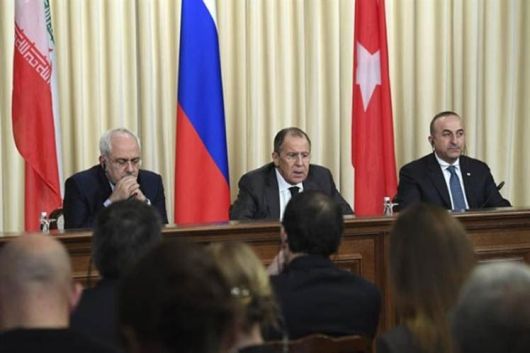Putin Heaps First Obstacle for Trump in the Middle East
Vladimir Putin began flexing a muscle for testing US President-elect Donald Trump when he invited the Iranian foreign minister Mohammad Javad Zarif to the trilateral meeting with Russia’s Sergey Lavrov and Turkey’s Mevlut Cavusoglu in Moscow Tuesday, Dec. 20, to discuss the next steps in Syria,
US Secretary of State John Kerry was pointedly not invited, despite his long and deep pursuit of joint diplomacy with Russia for resolving the Syrian crisis.
But Secretary Kerry’s non-invitation and the scorn the Kremlin showed thereby for the Obama administration were less significant than the invitation that Moscow did extend to Iran and its implications for the incoming US president.
Were Presidents Vladimir Putin and Tayyip Erdogan trying to bring Donald Trump to heel on Iran and accept a role in the Syrian issue for Zarif who, for the president-elect, personifies the excessive concessions extorted from his predecessor for the nuclear deal with Iran?
Ankara denied it had forged a “bargain” with Russia over Syria’s future.
“That’s not how we see it,” said the official in Ankara, “It is not like we make a kind of a bargain. We don’t see any connection,” he said.
For some clarity on what has been going on between Moscow and Ankara in northern Syria, DEBKA Weekly’s intelligence sources point to quiet moves that led up to Aleppo’s fall to the Assad government.
In November, Turkey struck a secret deal allowing Russia to help Assad retake all of Aleppo, while Moscow agreed to stay out of Ankara’s military operation in northern Syria – with one proviso: the Turkish army must hold back from attacking the ISIS-occupied town of Al-Bab, 55km north of Aleppo.
The rationale behind this proviso was simple: Allowing the Turkish army to come close to Aleppo would give the beleaguered rebels a new lease of life.
Evidence of the deal emerged when Wednesday and Thursday, Dec. 21-22, after the Aleppo battle was over, Turkish troops pressed forward with their operation to wrest Al-Bab from the jihadists..
According to the information reaching our sources, the Trump team gave this deal the nod, insisting only that Moscow co-opt Ankara to any arrangements made for the rest of northern Syria after the fall of Aleppo.
The ceasefire brokered by Russia and Turkey for allowing the mass exodus of civilians from the embattled city was likewise tacitly approved by Trump’s advisers.
Their goal was to let Putin and Erdogan keep the lid on the situation until the new US president took office on Jan. 20. A decision would then be made on whether the US would join the bilateral setup.
However, this week, Putin took a surprise step outside this agreed framework by attaching the Iranian foreign minister to the deliberations in Moscow on the next steps for Syria.
A Turkish official reported: “The Russians suggested Turkey, Russia and Iran come together for a solution initially over Aleppo, which may be further enlarged to other parts of Syria.”
He added the hope that the talks would be a “good opportunity to understand what is happening, where we all stand and discuss where we go from here.”
It turned out that no Russian or Turkish officials briefed the incoming National Security Adviser Lt. Gen. Michael Flynn on the trilateral makeup of the Moscow forum.
Putin and Erdogan are fully aware of the future Trump administration’s sine qua non to throw Iran and its Shiite militias, including Hizballah, out of Syria and Iraq (as we first revealed in DEBKA Weekly 736 o Dec. 16).
After the ministerial meeting ended, the Turks appeared to recognize that antagonizing the incoming American president might be unwise and partially backpedaled.
And so Turkish Foreign Minister Cavusoglu told reporters that a cease-fire in Syria “should not cover terrorist groups like the Islamic State and the Fatah al-Sham Front [former Nusra Front], or the Lebanese pro-Assad Shiite Hizballah. He advised the world community to target not only ISIS and Fatah al-Sham, but also “other groups including Hizballah.”
The Iranian minister reacted stiffly by saying Iran "respects" Turkey's stance, but "other countries don't accept" it.
Lavrov, for his part, implied that since Hizballah had been invited by President Bashar Assad, its presence in Syria was as legitimate as Russia's own.
The brief meeting ended with a bland communiqué: Russia, Iran and Turkey "are expressing their willingness to help the Syrian government and the opposition draft an agreement and act as its guarantors."
This event showed Putin maneuvering to confront Trump with Iran as an indispensable partner in the resolution of the Syrian issue, whereas Erdogan seemed to back away from this position and amenable to meeting Trump halfway.
If that is what the Russian president is up to, he is unlikely to get very far in forging an understanding with the Trump administration.


